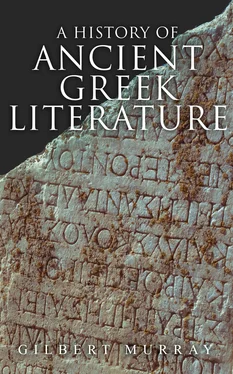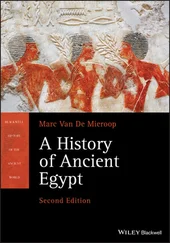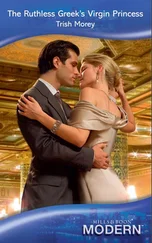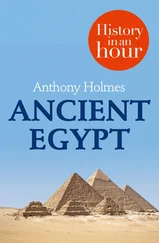The Vedic hymns offer an analogy. Hymns like them are implied by the fact that the titles of the Homeric gods, ἐκαεργòς 'Απóλλων, ßοωπις πóτνια "Hρη, ἐκατηßελέταο ἄνακτος, are obviously ancient, and are constructed with a view to dactylic metre. We know that the early oracles spoke in verse. We know that there were sacred hymns in temples, quite distinct from our secular Homeric preludes. We have evidence that the Mysteries at Eleusis depended in part on the singing of sacred music.
The Mysteries are not mentioned by Homer. That does not mean that they are late: it means that they are either too sacred or else too popular. The discoveries of anthropologists now enable us to see that the Eleusinian Mysteries are a form of that primitive religion, scarcely differentiated from 'sympathetic magic,' which has existed in so many diverse races. The Mysteries were a drama. The myth of the Mother of Corn and the Maid, the young corn who comes up from beneath the earth and is the giver of wealth, was represented in action. At the earliest time we hear of, the drama included a vine-god, or perhaps a tree-god in general, Dionysus. This is corn-worship and vegetation-worship: it is not only early, but primitive.
There were other Mysteries, Orphic or Bacchic. The common opinion of antiquity and the present day is that the Bacchic rites were introduced to Greece from abroad -- the god of the Thracian brought, in spite of opposition, into Greece. If so, he came very early. But it seems more likely that Dionysus is rather a new-comer than a foreigner: he is like the new year, the spring, the harvest, the vintage. He is each year, in every place, a stranger who comes to the land and is welcomed as a stranger; at the end of his time he is expelled, exorcised, cut to pieces or driven away. At any rate he is early, and for the real religion of Greece he is of overwhelming importance. A real religion is a people's religion. The great complex conception Dionysus-Bacchus was a common folk's god, or rather had united in himself an indefinite number of similar conceptions which were worshipped by common folk all over Greece. We hear of him mostly through Alexandrian and Roman sources, sceptical through and through, in which he is merely the god of wine. But this is degradation by narrowing. He is a wine-god; he is a tree-god; but above all he is one of the personifications of the spirit of ecstasy, the impulse that is above reason, that lifts man beyond himself, gives him power and blessedness, and lets loose the immortal soul from the trammels of the body. The same spirit, in a tamer, saner, and more artistic form, was absorbed in the very different conception of Apollo. This religion doubtless had the most diverse forms. The gods it worshipped varied in names and attributes as they varied in their centres of initiation. But the most important aspects of it seem to have been more or less united in the religious revelations of 'Orpheus.'
Most of the old religious poems belonged to Orpheus or his kinsman Musæus, as the heroic poems to Homer, and the didactic to Hesiod. But we know nothing of them before the great religious revival of the sixth century, associated with the name of Onomacritus. The old separate cults of tribe and family had been disturbed by increasing intercourse. Agglomerated in the Homeric theology, they lost their sanctity; and they could scarcely survive Hesiod and his catalogues. Hence came, on the one hand, scepticism embodied in the Ionian philosophy, and the explanation of the world by natural science; on the other hand, a deeper, more passionate belief. It was all very well for Thales to be saved by knowledge; the common man could not look that way. Amid the discouragements of the sixth century, the ebb of colonisation, the internal wars, the fall of Sybaris and of the half-divine Nineveh, came the turning away from this life to the next, the setting of the heart on supernatural bliss above the reach of war and accident.
Hence arose a great wave of religious emotion scarcely represented in our tradition, but affecting every oracle and popular temple from Caria to Italy. The main expression of this movement was Orphism. It appears first as an outburst of personal miracle-working religion in connection with Dionysus-worship. We can make out many of the cardinal tenets. It believed in sin and the sacerdotal purging of sin; in the immortality and divinity of the soul; in eternal reward beyond the grave to the 'pure' and the 'impure' -- of course, none but the initiated being ultimately quite pure; and in the incarnation and suffering of Dionysus-Zagreus. Zagreus was the son of Zeus and the Maiden (Korê); he was torn asunder by Titans, who were then blasted by the thunderbolt. Man's body is made of their dead ashes, and his soul of the living blood of Zagreus. Zagreus was born again of Zeus and the mortal woman Sernelê; lived as man, yet god; was received into heaven and became the highest, in a sense the only, god. An individual worshipper of Bacchus could develop his divine side till he became himself a 'Bacchos,' his potential divinity realised.
So a worshipper of Kybêbê in Phrygia became Kybêbos; and many Orphic prophets became Orpheus. The fabled Mænad orgies never appear historically in Greece. The connection with wine was explained away by the elect, and was in reality secondary. Dionysus is the god within, the spirit of worship and inexplicable joy: he appears best in communion with pure souls and the wild things of nature on the solitary mountains under the stars.
The Orphic hymns brim over with this joy; they are full of repetitions and magniloquence, and make for emotion. The first hymn -- very late but typical -- runs: " I call Hecatê of the Ways, of the Cross-ways, of the darkness, of the Heaven and the Earth and the Sea; saffron-clad goddess of the grave, exulting amid the spirits of the dead, Perseia, lover of loneliness, Queen who holdest the Keys of the World, . . . be present at our pure service with the fulness of joy in thine heart. "
That hymn dates from the fourth century A.D., and so do most of our complete Orphic poems. We only possess them in their last form, when the religion was a dying thing. But it is a remarkable fact, that there is no century from the fourth A.D. to the sixth B.C. which is without some more or less celebrated Orphic teachers. At the height of the classical epoch, for instance, we know of a strong Orphic 'spirit in Pindar, Empedocles, Ion of Chios, Cratinus the comedian, Prodicus the philosopher, and probably in Euripides. Plato complains of the "crowd of books by Orpheus and Musæus," and inveighs against their doctrine of ceremonial forgiveness of sins. Besides this 'crowd' -- in the case of Musæus it amounted at least to eleven sets of poems and numerous oracles -- there were all kinds of less reputable prophets and purifiers. There was a type called 'Bakis' -- any one sufficiently 'pure' was apparently capable of becoming a Bakis -- whose oracles were a drug in the Athenian market. Epimenides, the medicine-man from Crete, who purified Athens after Kylon's murder, was the reputed author of Argonaulika ,* Purifications ,* and Oracles .* Though he slept twenty years in a cave, he has more claim to reality than a similar figure, Abâris, who went round the world with -- or, as some think, on -- a golden arrow given him by Apollo. Abaâris passed as pre-Homeric; but his reputed poems were founded on the epic of the historical Aristeas of Proconnêsus about the Arimaspi, which contained revelations acquired in trances about the hyperboreans and the griffins. Aristeas appeared in Sicily at the same time that he died in Proconnêsus.
These were hangers-on of Orphism; the head centre seems to have been Onomacritus. He devoted himself to shaping the religious policy of Pisistratus and Hipparchus, and forging or editing ancient Orphic poems. He is never quoted as an independent author. The tradition dislikes him, and says that he was caught in the act of forging an oracle of Musæus, and banished with disgrace by Hipparchus. However, it has to admit that he was a friend of that prince in his exile, 7and it cannot deny that he formed one of the chief influences of the sixth century.
Читать дальше












